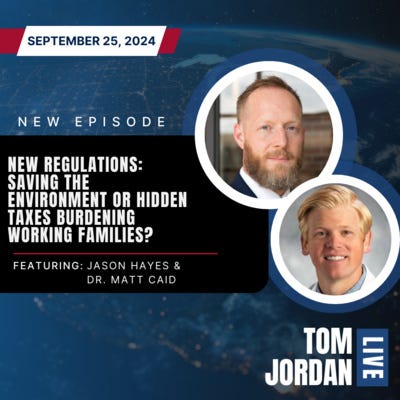
Picture generated using Grok AI. (2024). xAI. Depicts a dystopian future where transportation becomes increasingly difficut as strict low carbon fuel standards are imposed.Note: in the intro to this episode, I incorrectly described the House Bill as “HB 5089” - that is incorrect. The correct bill number is HB 5083 of 2023. You can access that bill on the Michigan Legislature’s website.
The Senate’s low carbon fuel standard bill, SB 275, is also available on the Michigan Legislature website.
Here’s the audio of my September 25 interview with Tom Jordan on Tom Jordan Live. Tom and I discuss the just-published Mackinac Center report, “Low carbon, high cost: How a clean fuel standard would increase gas prices and living costs in Michigan.”
I give a short intro to the interview in the opening section before I include the audio of the interview in this podcast. (Note that I have cut the full program down, so only the audio of my interview is included here. You can hear the full show via Tom’s Spotify page or on the Apple Podcast app.)
Here’s the brief write-up from the Mackinac Center’s website for the “Low carbon, high costs” report.
This report explains the costs and benefits of a so-called clean fuel standard in Michigan. We estimate that such a standard would increase gasoline costs by about $350 per year for a typical Michigan household. The extra costs Michigan drivers would pay at the pump will not help upgrade the state's roads and bridges. In fact, the proposal would reduce revenue for roads, because higher prices mean drivers will purchase less fuel, reducing gas tax revenues. The primary beneficiaries of the standard will be companies that profit from producing and selling so-called clean fuels.
The proposed clean fuel standard would increase the state budget, as the program would cost millions to run. Lawmakers would have to either raise taxes or redirect current spending priorities. A clean fuel standard would increase costs for local governments as well.
We relied on the excellent work done by Isaac Orr and Mitch Rolling, The Energy Bad Boys, to model the expected costs and impacts of the Senate Bill. Isaac and Mitch were joined by my son, Ewan Hayes to write the report.
Also, the House Bill has a more extreme carbon intensity reduction mandate—a 35% reduction in the carbon intensity of transportation fuels by 2035 (from a 2019 baseline) vs. the 25% requirement in the Senate bill. Our report models the Senate bill and, therefore, depicts a more conservative (less expensive) outcome if the low carbon fuel standard is mandated in Michigan. (If the House Bill is passed, costs for fuels would be even higher.)
Last point: Near the end of the interview, Tom and I also had a chance to discuss the findings of another recent Mackinac Center report, “Shorting the Great Lakes Grid” (with thanks to Meredith Angwin for welcoming our use of that name).













Share this post